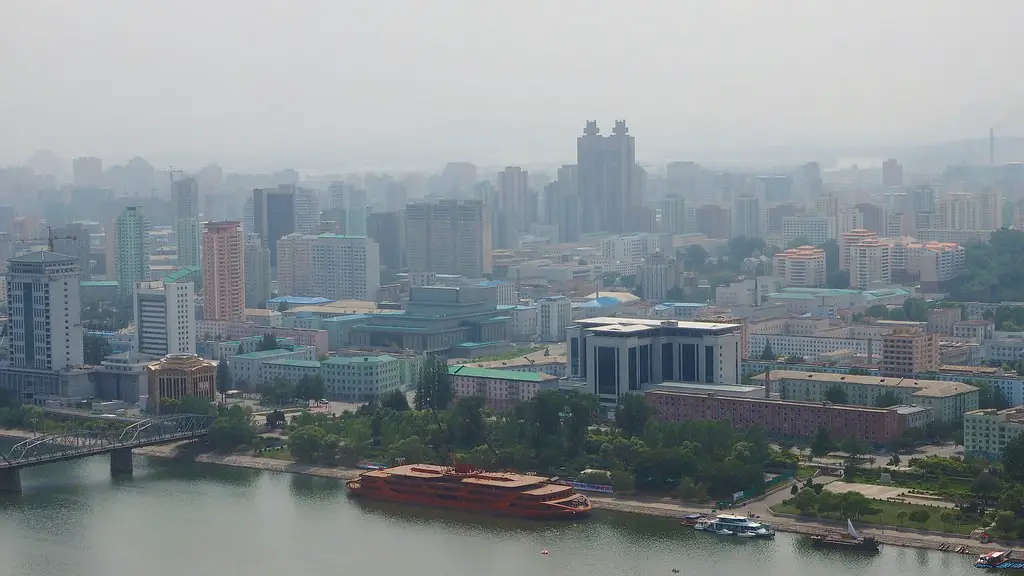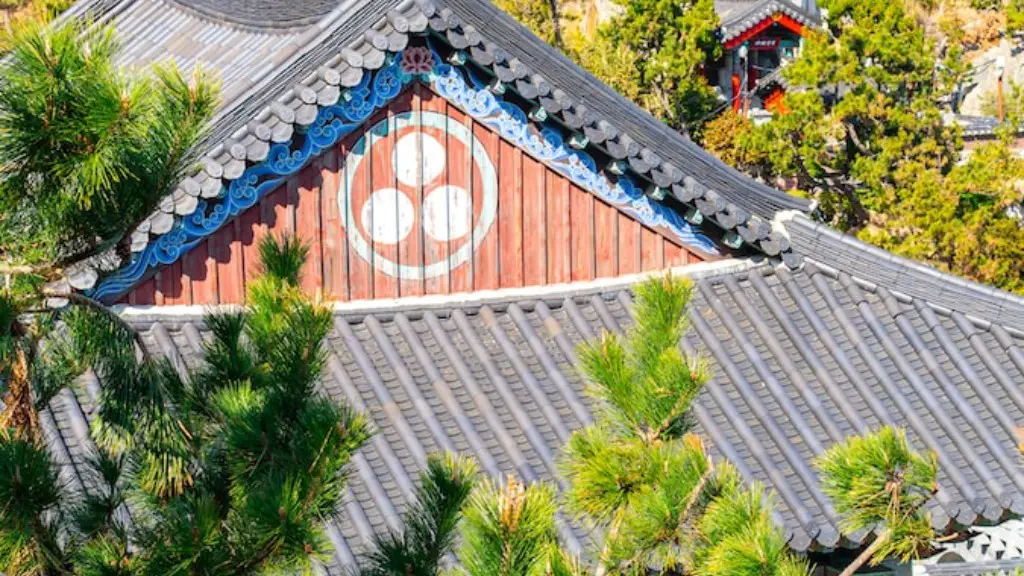North Korea’s Nuclear Program
North Korea’s nuclear weapons program has accelerated over the past two decades, with a series of tests, improvements, and advances. North Korea declared itself a nuclear power in 2006 and has since conducted several tests of nuclear weapons and long-range missiles, to varying degrees of success. In 2017, the country declared that it had achieved “full nuclear capability” and could now target the United States with nuclear-tipped intercontinental ballistic missiles, although it is unclear exactly how effective these weapons are.
North Korean leader Kim Jong Un has made it clear that his country is committed to maintaining and expanding its nuclear weapons program. He has stated that the nation’s nuclear capabilities “represent the will of all Koreans” and is the “strongest guarantee of our sovereignty,” and that the program is the cornerstone of North Korea’s defense strategy.
The rhetoric from North Korea has heightened tensions with the United States and other nations and raised the specter of a nuclear conflict. The United States and its allies have imposed economic sanctions on North Korea in an effort to halt its nuclear program.
International disarmament experts worry that North Korea’s nuclear program could lead to a calamitous meltdown. The country is thought to have a stockpile of around 10 to 16 nuclear warheads, but its technology is relatively undeveloped compared to that of the United States and other nuclear powers. That could mean North Korea’s weapons are less reliable than those of other countries and potentially riskier. This could increase the chances of an accidental nuclear detonation.
North Korea refuses to negotiate with the United States and its allies, and Kim Jong Un remains steadfast in his desire to develop the country’s nuclear capabilities. Pyongyang has said it is only willing to enter talks with Washington if the United States agrees to accept its nuclear status, a stance the U.S. has rejected out of hand.
The result is a stalemate, with the world living in a precarious balance between nuclear disaster and an effective resolution. Some experts cast doubt on the notion that North Korea is trying to start a nuclear war, arguing instead that its posturing is more about its leader’s sense of pride and a desire for attention and respect.
Nevertheless, nuclear experts worry about the risks associated with North Korea’s nuclear program. While experts agree that the chances of North Korea launching a nuclear attack are low, the possibility remains of a miscalculation or technical failure that could set off a chain reaction. In the worst-case scenario, such a mistake could trigger a massive regional conflict that could have devastating consequences, particularly if it escalates to a nuclear war.
The US-North Korean Standoff
The US-North Korean standoff over nuclear weapons is one of the most dangerous conflicts in the world today. President Donald Trump has engaged in a fiery war of words with the North Korean leader, and the prospect of military action remains very real. The risk of a nuclear catastrophe is such that many of the world’s leading powers, including China and Russia, have sought to defuse the situation through diplomacy and negotiations.
The two sides have so far failed to find enough common ground to bring about a resolution. Trump has threatened military strikes if Pyongyang does not abandon its nuclear ambitions, while North Korea has warned of retaliation if its sovereignty is violated.
The lack of agreement between the two countries reflects the difficulty of finding a peaceful solution to the crisis. Both sides have large nuclear arsenals, and both have indicated they are willing to use them if their demands are not met. This has created a situation of mutually assured destruction and heightened the prospect of a disastrous war.
In addition, North Korea has built a sophisticated system of underground bunkers and tunnels, making it difficult for the US and its allies to identify and target the country’s nuclear facilities. Creating a controlled environment where inspectors could safely investigate North Korea’s nuclear weapons would also be difficult, as the possibility of insider threats remains high.
Concerns Over North Korea’s Ballistic Missiles
One area of particular concern is North Korea’s advanced ballistic missile program, which could potentially reach the United States mainland. In 2017, North Korea launched a number of intercontinental ballistic missiles (ICBM) that flew higher and further than any of its previous tests.
The country appears to be intent on developing a missile that could reach the continental United States. This has further increased the tension between the two countries and raised the prospect of a nuclear attack on the US mainland. The Trump administration has responded to North Korea’s advancing missile capabilities by deploying missile defense systems in the region.
The US military has conducted several joint military exercises with allies in the region and conducted drills to prepare for the possibility of a surprise attack. But the reality is that there is no 100 percent effective defense against a nuclear attack, and even the most sophisticated defenses can be easily overwhelmed.
The Impact On The International Community
The possibility of a nuclear conflict with North Korea has had a profound effect on the international community. Nations around the world have expressed growing concern about the risk of a nuclear war, and many have taken steps to prevent it.
The United Nations Security Council unanimously passed a number of sanctions against North Korea for its nuclear and ballistic missile programs. Additionally, several countries, including the United States, China, and South Korea, have cut or reduced ties with North Korea, limiting investment and trade.
But despite these international efforts, North Korea has shown no inclination to abandon its nuclear program. The country claims its nuclear weapons are necessary for self-defense and has vowed to increase its nuclear capabilities.
These developments have highlighted the need for a diplomatic solution to the crisis. However, most efforts to bring about a negotiated solution have failed, highlighting the difficulty of finding common ground between the US and North Korea.
The Role Of China
China has an important role to play in the US-North Korea standoff. As North Korea’s primary trading partner and closest ally, China has the most leverage over the country and is ideally placed to help bring about a diplomatic solution to the crisis.
China has already taken some steps to pressure North Korea, such as joining the United Nations’ sanctions against the country. But it also refuses to push too hard, and some analysts have argued that China is only interested in preserving its influence in the region and it is not as concerned about the North Korean nuclear threat as the United States and its allies.
The Risks Of War
The risk of war between the United States and North Korea is ever-present, and no one knows how events will play out if tensions continue to escalate. Indeed, any conflict would be unpredictable and potentially catastrophic, with the possibility of a nuclear exchange and no clear strategies for either side on how to de-escalate the crisis
Still, most analysts believe that the chances of North Korea actually using its nuclear weapons are extremely low. The country’s leaders are aware of the catastrophic consequences of starting a nuclear war, and there is hope that they may ultimately be persuaded to find a way to peacefully resolve the crisis.
The International Response
The escalation of tensions between the United States and North Korea has prompted a strong response from the international community. Most notably, China, Russia, and other countries have urged the two sides to find a peaceful resolution to the crisis.
In addition, a number of countries, including the United States, South Korea, and Japan, have offered North Korea economic incentives in return for the dismantling of its nuclear program. These incentives have so far been unsuccessful, but they have shown that the international community is committed to finding a peaceful solution to the conflict.
Conclusion
The situation on the Korean Peninsula remains tense and dangerous. North Korea’s nuclear capabilities have advanced, raising the specter of a nuclear conflict and the possibility of catastrophic consequences. The international community has called on all parties to work together to find a peaceful resolution to the crisis. But it will be a difficult and complex task, and the future remains uncertain.


